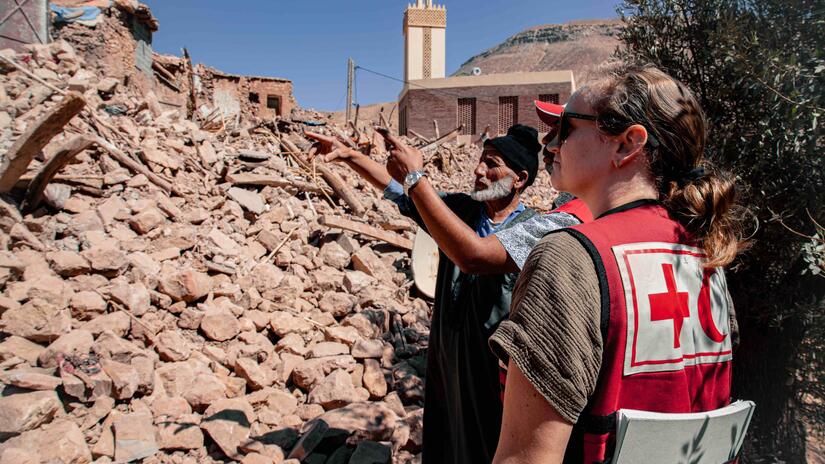Geneva/Beirut/Marrakesh, 6 October 2023: Nearly one month since the devastating earthquake in Morocco, the International Federation of Red Cross and Red Crescent Societies (IFRC) highlights urgent humanitarian needs as winter approaches. Immediate requirements include warm shelter for those who have lost or incurred damage to their homes and crucial hygiene infrastructure like latrines and showers.
From the start, the Moroccan Red Crescent Society has been on the ground. Together with IFRC support, the teams are closely collaborating with local authorities to assess needs and deliver assistance. Active in the four most impacted provinces—Taroudant, Marrakech, Chichawa, and Al Haouz—the Moroccan Red Crescent currently has hundreds of volunteers engaged, providing relief items and psychosocial support. One month into the response, the need to scale up shelter and sanitation efforts remains critical.
To date, the Moroccan Red Crescent, supported by the IFRC, have reached over 50,000 people. More than 290 volunteers have been deployed across affected provinces. They have supported search and rescue operations, organized medical caravans and established makeshift medical tents. The teams have also conducted blood donation drives and offered psychosocial support to affected people, even in the most remote villages.
Gwendolen Eamer, Head of Emergency Operations for the IFRC, said:
"The earthquake has devastated thousands of families, exposing them to harsh conditions. Our teams are working tirelessly, but the scale of the need is overwhelming, particularly as winter is closing in on the High Atlas Mountains. Time is of the essence. We are racing against the clock to provide insulated shelters and winter essentials. Our appeal targets not just immediate needs but is intended to prepare these communities for a harsh winter and build their resilience for the years to come."
Given the region's high altitude of between 1500-2000 meters, the cold is especially piercing for those without adequate shelter. While initial relief has provided some basic accommodations, the pressing need for insulated shelters and winter provisions is escalating.
Sami Fakhouri, Head of Delegation, Morocco, IFRC, added:
“Coordination with local authorities has been pivotal in sustaining our response efforts. Our volunteers are the lifeblood of these operations, often reaching places others can't. Yet, as winter approaches, some families are worried not just about the cold but about living in dignity and reuniting with their loved ones. We are actively seeking solutions to upgrade or adapt shelters for the winter months. The real test lies ahead, and failing is not an option."
The IFRC Emergency Appeal seeking CHF 100 million to support the Moroccan Red Crescent’s response has been funded up to around CHF 19 million, with a current funding gap of approximately 81%. Continued support and funding are desperately needed to significantly impact those affected, enabling them to rebuild their lives and contribute to local economies.
More information
To fund the emergency appeal and support the people of Morocco in their time of dire need, visit the IFRC website.
For b-roll footage, visit the IFRC newsroom.
To request an interview, contact: [email protected]
In Geneva:
Tommaso Della Longa: +41 79 708 43 67
Mrinalini Santhanam: +41 76 381 50 06
In Beirut:
Mey Alsayegh: +961 3 229 352





